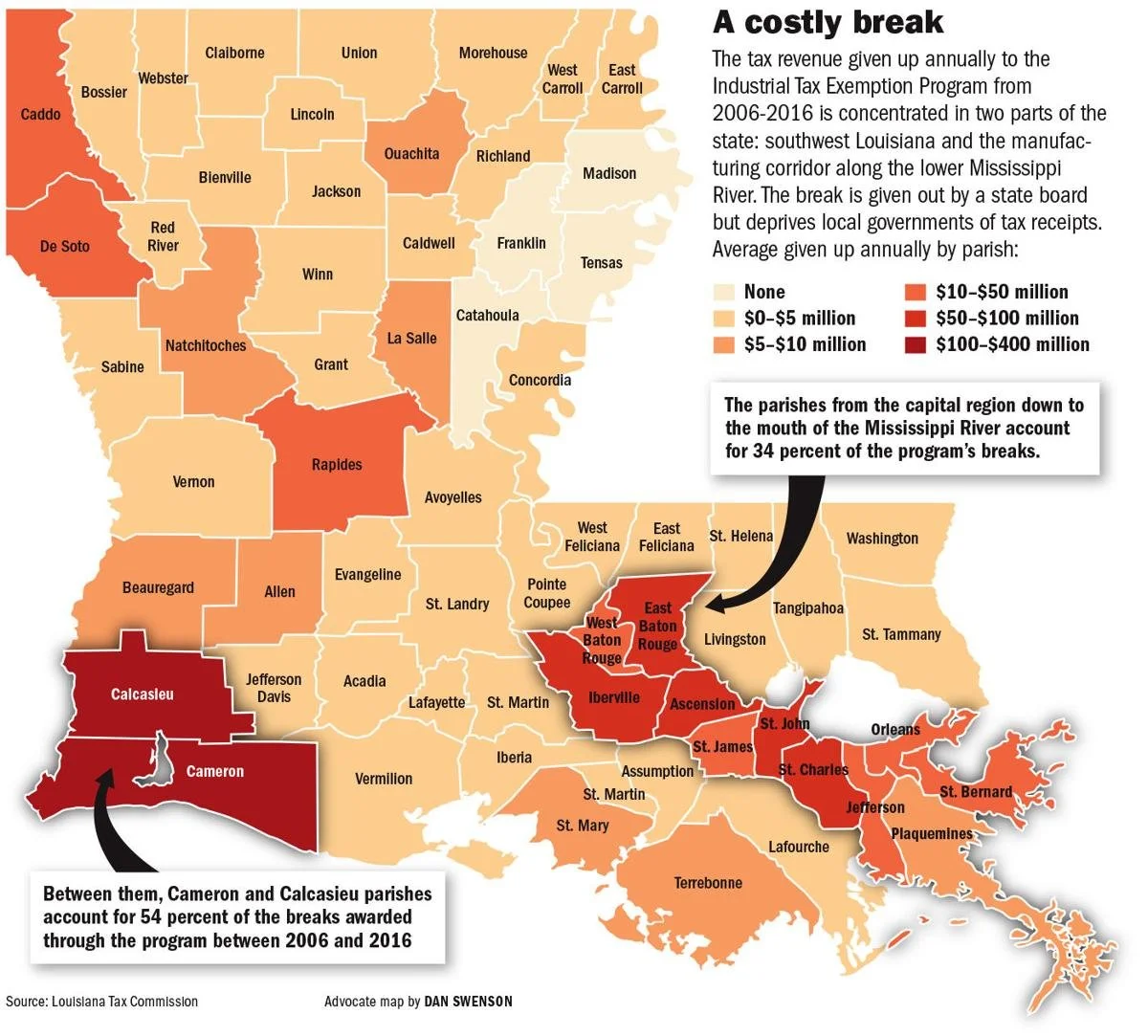Weaker Air Pollution Rules Threaten Louisiana Families in Cancer Alley
For 85 miles between Baton Rouge and New Orleans, massive chemical plants loom over the
Mississippi River in an area known as “Cancer Alley”. The families in these communities face
some of the highest cancer risks in the nation. Now, their health and safety are under even greater
threat following recent federal decisions to weaken air pollution regulations.
(Photo: Wiki)
Safeguards Before Federal Rollbacks
Under the Clean Air Act, the Environmental Protection Agency (EPA) set standards that required
chemical plants and refineries to reduce emissions of toxic air pollutants, including chemicals
like ethylene oxide, benzene, and formaldehyde. These standards, based in the latest scientific
research, were designed to protect people working and living near these facilities. This protection
is especially critical in Louisiana’s river parishes, where families have been exposed to
hazardous levels of air pollution for generations.
Under the EPA’s standards, facilities are required to implement chemical monitoring systems,
adopt pollution-control technologies, and comply with strict deadlines to reduce emissions.
These safeguards helped to limit exposure to dangerous chemicals and gave residents some
measure of protection against the health risks associated with living near chemical plants.
A Two-Year Break on Pollution Controls
Under Section 112 of the Clean Air Act, the President has the authority to exempt certain
facilities from compliance with EPA standards for up to two years if the technology to meet the
rules is “unavailable” or if it is deemed in the national interest. Recently, this power was used to
grant multiple Louisiana facilities a two-year reprieve, delaying enforcement of stricter pollution
controls.
For residents in nearby communities, this is not just a policy change, it is a real health threat.
Every extra year that plants operate without enhanced monitoring or control technologies
increases exposure to chemicals that can cause cancer, respiratory problems, and other serious
illnesses.
Which Facilities Are Affected?
The rollback impacts facilities across Louisiana, including:
• Shell Chemical in Norco
• Dow Chemical in Plaquemine
• Formosa Plastics in Baton Rouge
• BASF in Geismar
• ExxonMobil in Baton Rouge
• Occidental Chemical in Geismar
• DuPont in LaPlace
• Union Carbide Corporation in Taft
• Westlake Vinyl in Lake Charles
• Rubicon in Geismar
• CITGO in Lake Charles
• Total Energies Petrochemical in St. Gabriel
• Denka Performance Elastomer in LaPlace
• Sasol Chemicals in Lake Charles
Read the national list of exempt facilities here.
These plants already rank among the highest emitters in the state. Giving them two more years of
leeway means continued danger for the communities surrounding them.
“Have you lived or worked near one of these facilities and recently
been diagnosed with cancer? Contact us today for a free case review.
Why These Regulations Matter for Louisiana
Unfortunately, Louisiana residents know the dangers of living near chemical plants all too well.
In parishes along the Mississippi River, cancer rates are alarmingly high, and children often
struggle with asthma and other respiratory illnesses. Generations of residents face long-term
health challenges, including neurological problems and complications related to reproductive
health.
Make it stand out
Air quality standards were meant to reduce these harms. Rolling back enforcement not only
increases health risks but also puts additional strain on communities that have been advocating
for cleaner air for decades. Parishes like St. John the Baptist, St. James, and Ascension are home
to families who have long worked to protect their families from toxic exposure.
Health Risks from Toxic Emissions
Scientists have linked long-term exposure to toxic air pollutants with devastating health effects,
including:
• Cancers such as leukemia and non-Hodgkin’s lymphoma
• Respiratory illnesses like chronic bronchitis and asthma
• Neurological problems from long-term exposure
• Reproductive harm and birth defects linked to certain chemicals
For those already living in the shadow of these facilities, every extra year of exposure increases
the risk.
Standing Up for Louisiana Families
At the Law Office of Philip C. Hoffman, we know that Louisianans deserve better. Families
should not have to choose between staying in their homes and protecting their health. Our firm is
dedicated to representing individuals who have been harmed by toxic exposures, including
asbestos and other industrial pollutants.
If you or a loved one have been diagnosed with cancer or another serious illness after living or
working near a Louisiana chemical plant, the Law Office of Philip C. Hoffman can help. We
hold corporations accountable and fight for the justice Louisiana families deserve. Contact us
{e=document.createElement()


